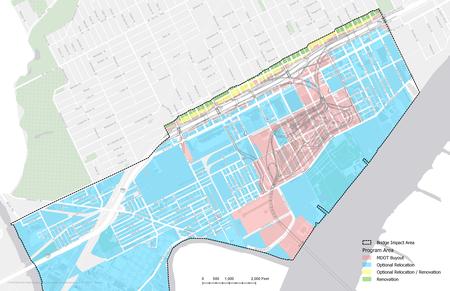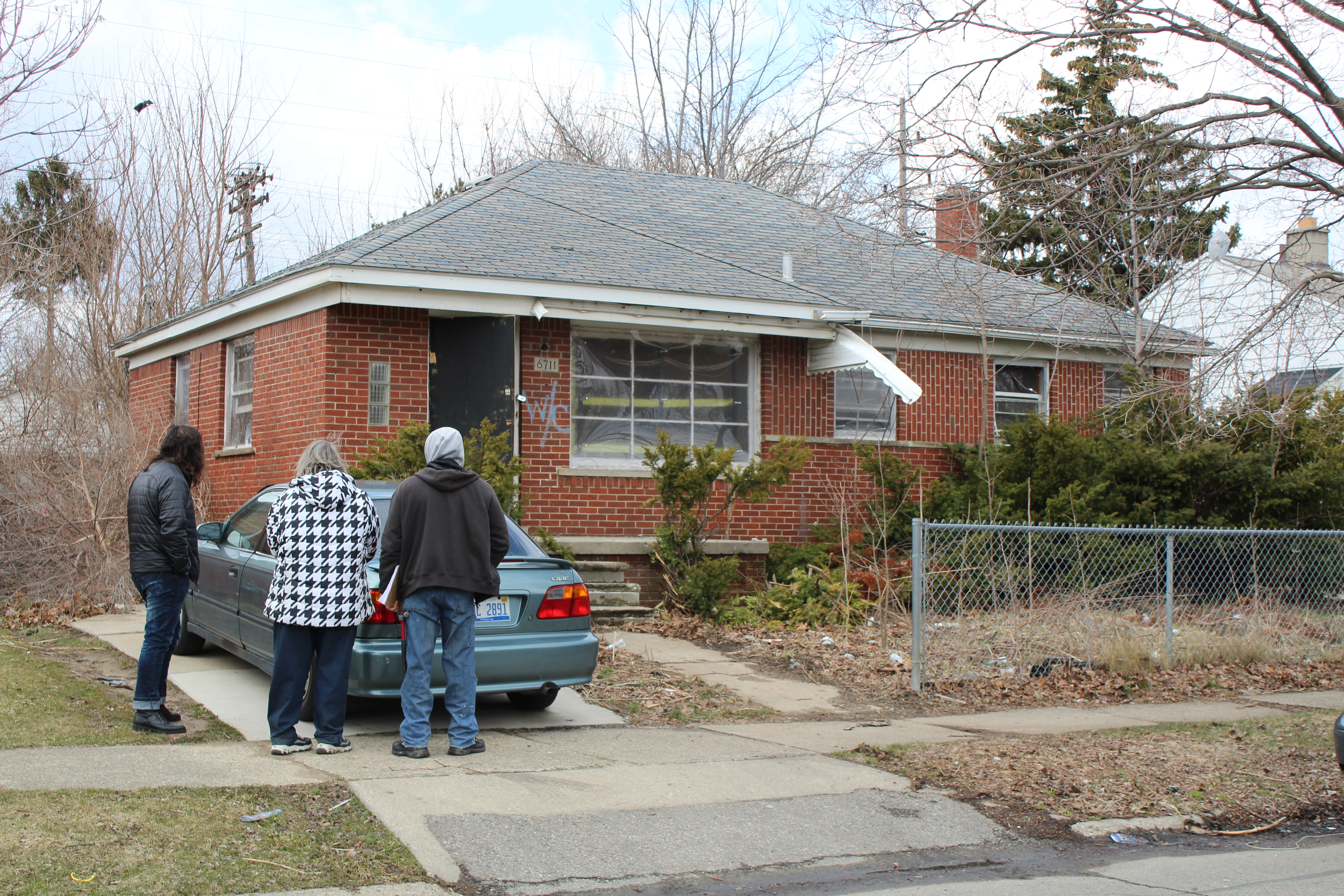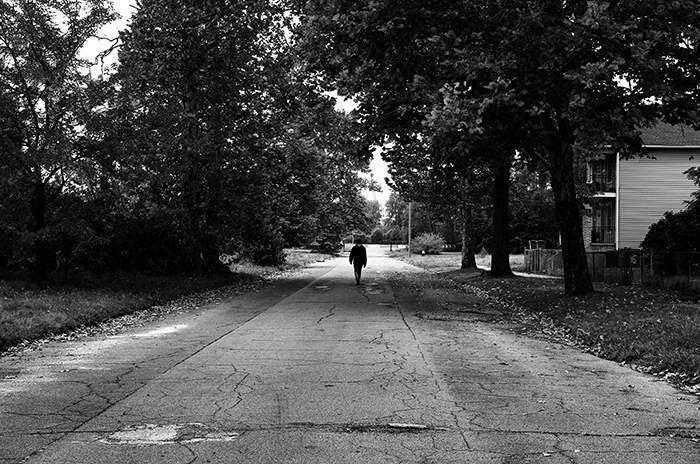City Official Reflects on Implementing Home Swap Program [Transcript]
“At the end of the day… you don’t want to give money for folks to go to Southfield or Romulus.”

Construction began this year on the Gordie Howe International Bridge that’s being built by the Michigan Department of Transportation (MDOT) and the city of Windsor over the Detroit River.
Eminent domain has required homeowners living on land needed for the bridge to sell their properties. MDOT has used this process to acquire more than 600 parcels of land.

Now, the Home Swap program, administered by the city of Detroit, is giving some residents living near the bridge with homes that did not fall to eminent domain, the option to exchange their homes for abandoned Land Bank-owned properties in another Detroit neighborhood.
The program came out of a community benefits agreement that residents living near the bridge fought for. The agreement also includes money for jobs, health monitoring and home improvements. These benefits are being paid for by $45 million raised from city-owned land that was needed for the bridge.
To be eligible for the Home Swap program specifically, residents must live in a designated area near the bridge, own the deed to their home, and be up-to-date on their tax and water bills.
Related Story: The experience of one Home Swap participant.
When the Home Swap program opened at the end of last year, 57 families applied. In March, these families were invited to look at 10 available houses located in three Detroit neighborhoods: Warrendale, Morningside and Springwells. Meet-and-greets were held to introduce families interested in the program to current residents in these areas.
Home Swap participants had until March 29 to submit their top picks from these 10 houses. After submitting, houses were then allocated according to a “Delray Score.”
Interview with the City of Detroit’s Charity Dean
Charity Dean is the director of the city’s Bridging Neighborhoods program that administers Home Swap. She was interviewed by WDET’s Laura Herberg in early April to talk about the program just after the first match round had been completed.
<<Click on the audio player above to hear their conversation.>>
Laura Herberg: Where are you at with the Home Swap program?

Charity Dean: The results of our first match period are out. We had 12 families make selections. They all picked the same four houses! So, we have four houses matched in the first match period which I think is a huge win. Again this is new, we’re trying things out, but the fact that 12 families were ready to make a selection was really huge. And of the four houses that have been chosen, every neighborhood was chosen. So we’ve got two [houses chosen] in Southwest, one in Morningside and one in Warrendale.
Laura Herberg: The fact that they chose the same four houses, how is that going to inform the houses that you pick moving forward?
Charity Dean: Well, you know it’s interesting… they chose the same four houses but they’re all uniquely different. For example, we had a ranch in Warrendale that multiple people chose. And then we had, it was a bigger house, two floors, in Morningside that multiple people chose. The house in Morningside had some work done already so it was easier for people to see kind of what that that looked like. But there are certain people that just want to ranch and we didn’t have a lot of ranches. I think we had two or three ranches. The one ranch in Warrendale, many people wanted.
One of the things that I can say for sure is we’re not done with those neighborhoods. We could not have chosen better neighborhoods to start. They have rolled out the red carpet for Delray families. It’s been warming. For me, I’m a Detroiter through-and-through so I get chills hearing the Morningside president talk to Delray families and they know about what’s going on in their neighborhood and that matters to the families that we’re moving. For them to come to a meet-and-greet and meet the person in charge of Radio Patrol or meet the person that calls themself “the sheriff” of the street where we have a house, that’s huge.
Related Story: Riding Along with a Detroit Citizens Radio Patrol Team
Laura Herberg: In Delray, given the vacancy, some families have been able to acquire some pretty sizable lots. I’ve gone through there and seen some impressive set-ups. The houses that you are able to choose for this program, are they comparable to the ones that these families are leaving behind?
Charity Dean: I think it depends on the house. Some of them are. For example in the first match period I think we had two houses that had lots attached to them. For one of the houses, [I think] in Southwest, you get two parcels. You get the house and the side lot. Where we can get houses with lots, the Detroit Land Bank has been extremely helpful in that. But in terms of being comparable, even if you drive through Delray, not all the houses look the same. And so we’ve asked folks when they’ve applied, “What are you looking for?” We’ve found, especially some of our seniors, are not looking for what they have in Delray. They’re looking for a ranch, they don’t want the two stories. To the extent that we can, we want to be [giving people comparable homes and lots], but we also just want to let people make the choice that they feel is best for them and their families.

Laura Herberg: Let’s talk about what happens after the match period. I was surprised to find out that these are essentially gutted homes and they’re going to be renovated. Talk about that process and what say the new homeowner will have in the renovation.
Charity Dean: The houses are from the Detroit Land Bank… If you ever go to a Land Bank open house, because they’ve been doing the open houses for a while, you go in and you see a house in its worst condition… I’ll say it like that. But we have the opportunity to say, “We’re going to make this pretty for you. We’re going to make this beautiful for you.” We want to make sure that we are doing the ugly stuff, the behind the scenes stuff, the mechanicals the electrical, the plumbing, that kind of stuff. So, we’re making sure that we can do that and fit that within the budget. The residents get to pick a package. At the meet-and-greets we have packages available for them to say, “I want the mahogany package,” which is darker cabinets. Or, “No, I actually like this one with the lighter cabinets.” The package shows them the cabinets, the paint color, the carpet… those are the type of things that they can choose from.
Laura Herberg: And what is the budget?
Charity Dean: It depends but our budget for rehab is really about $65,000-75,000.
Laura Herberg: Has that renovation price-point informed the houses that you’re able to choose?
Charity Dean: Oh, it absolutely informs the houses that we’re able to choose, especially because we’re getting our start from the Detroit Land Bank. Some of the things that our staff does is, we’ve got field inspectors that go out and look and they assess the outside first. A lot of times you can tell if you’re going to be spending anywhere from $30,000-$40,000 on the outside alone. It may not even be worth going on the inside because you’ve already shrunk your budget. They’re looking at foundation issues, which are huge. They’re looking at the roof. They’re looking at all of these things. The Land Bank has been extraordinary in giving us inventory that we can work with. We’ve been able to find homes where the foundation is solid. And a lot of the Land Bank homes need a lot of work and so we’re going to be spending a lot of resources on getting the houses up to code and making sure that they’re safe and they’re efficient for the families.
Laura Herberg: What happens if it goes over budget?
Charity Dean: That is a good question, Laura. I don’t have an answer at this time. We’re not there yet. I think we are doing so much work on the front-end so that we don’t run into that situation. We are intentional. When we get properties from the Land Bank we actually go in and scope the home before we can say we’ll do it or not. Our team goes in and says, “This is how much I think this will cost.” And we do it down to the penny so that we can be pro-active in that way.
Laura Herberg: Why not just give each family the $65,000 and let them do with it whatever they want?
Charity Dean: Ultimately I was brought in to implement an agreement. This agreement was made with the community, really the Community Advisory Group. They wanted to be able to give folks an option to relocate. At the end of the day, though, we are the city of Detroit and you don’t want to give money for folks to go to Southfield or Romulus. We’re really trying to be resourceful and good stewards with the resources that we’ve been given for this program. We think that the Home Swap program is an excellent opportunity to not only give folks the option [to leave] but also to give hope to residents in neighborhoods that have been asking or really wanting new families.
Laura Herberg: Along those lines, how is this program going to impact the city?
Charity Dean: Because we are doing things with multiple end-goals, it’s not like, to your point, we’re just writing checks to folks. We’re really trying to make an impact on the neighborhoods in Detroit. And so there’s strategy behind that. With this program, we’re able to connect families to neighborhoods that want new neighbors and connect them to resources. They’re moving to more densely-populated areas. They’re connected to what it means to live in a Detroit neighborhood. Our program is doing something that we hadn’t really thought about. The agreement was really to give an answer to Delray families but the implementation of this program is really opening up what we really can do in the city of Detroit.
“The agreement was really to give an answer to Delray families but the implementation of this program is really opening up what we really can do in the city of Detroit.”
Laura Herberg: Let’s talk a little bit about the neighborhood that some of these homeowners are leaving behind. What will happen to their houses? What will happen to this area where some people are deciding to stay?
Charity Dean: The homes that are swapped for the program will be demolished. That’s another thing that we learned, again, from the Community Advisory Group. They said, when MDOT came and did the eminent domain, “If you leave that house standing there it will be vandalized. It could be burned,” and so we want to make sure that we’re demolishing those homes to provide safety for the folks that are still there.
Related Coverage: Delray: Beyond Isolation
What will happen with Delray? I don’t know. I know the city of Detroit is going to be doing a planning study very soon with Delray. In fact, my partners in the Planning Department have contacted me this week about moving forward with that planning study. And they’re working with the Southwest Detroit Community Benefits Coalition and the Community Advisory Group to do that. I think the planning study is going to begin at the end of this year.

Laura Herberg: Is there anything you want to make sure you get a chance to say about this program, things that you think you know people tend to misunderstand or something that isn’t really being communicated well, just something you just want to make sure that our listeners know about this program?
Charity Dean: What I would say is that Bridging Neighborhoods, think of us like a startup. We don’t have the answers and we are not pretending to have the answers. We really are working with the folks in Delray to find out what works and what doesn’t work. We will make changes as we go. We will make mistakes for sure…
Also, it’s an optional program. I think sometimes that is missed, that it is optional. This program exists as a response to something that the community wanted and it’s not the other way around. Sometimes people feel like, “Oh the city wants me to move,” and that’s not actually the case. This is an optional program for those who felt trapped. They felt like they didn’t get an option. They felt like maybe they were promised something and they didn’t get it. And so this program exists to give an option to those who want it and those that want to stay in Delray. Because there is no place like Delray. Those who want to stay in Delray are welcome to stay in Delray. And they’ll be able to partake in a planning study that’s coming soon.
